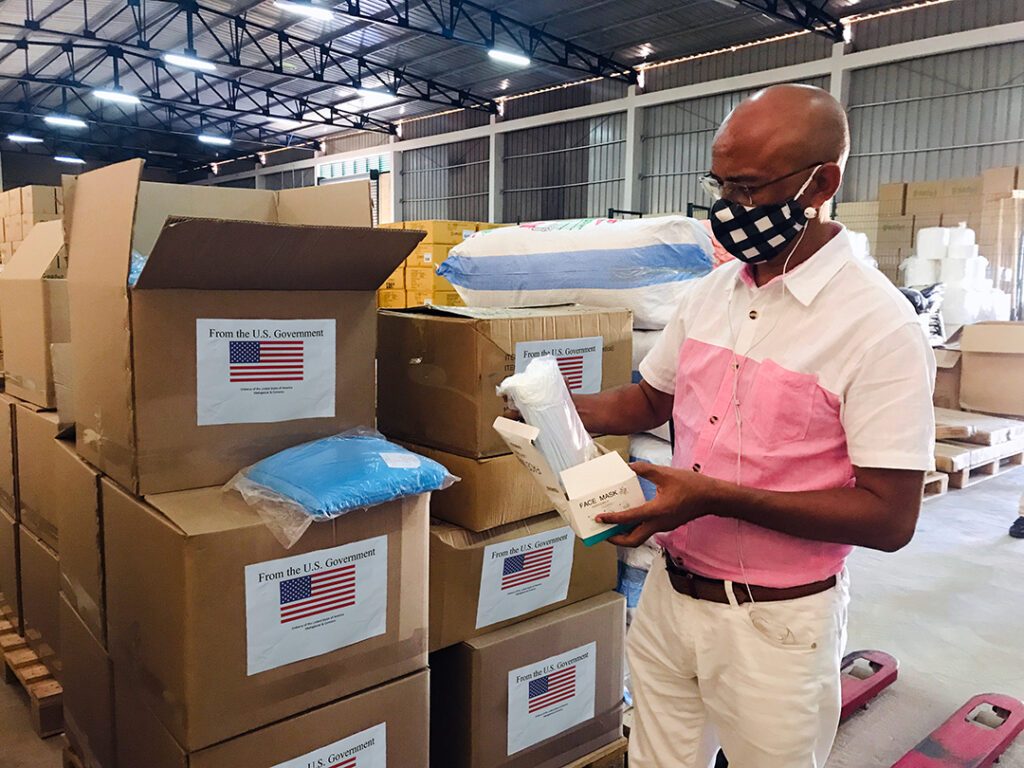ADF STAFF
Madagascar is facing a more infectious and deadlier second wave of COVID-19, which has forced the country to change its approach to combating the pandemic.
The United States government recently donated personal protective equipment (PPE) to help front-line health care workers continue to care for patients.
The U.S. Agency for International Development (USAID) on March 11 donated 45,500 medical-grade face coverings, 39,000 gloves, 2,600 disposable gowns, 2,600 disposable overshoes, 650 goggles, 650 thermometers, 260 jumpsuits and 650 bottles of sanitizing gel.
U.S. Africa Command (AFRICOM) purchased the locally made PPE, and Madagascar’s Ministry of Public Health identified the 13 areas most in need.
Dr. Joss Razafindrakoto, an infectious diseases specialist at USAID in Madagascar, touted the donation as a model for U.S.-Malagasy partnership.
“This project has been possible thanks to the excellent collaboration between the Ministry of Public Health, the U.S. Embassy and the USAID IMPACT project,” he told ADF. “We worked closely together to ensure this donation was available to protect health workers in case of a second wave of COVID-19 in Madagascar, which unfortunately we’re currently experiencing.
“This protective equipment is incredibly effective at protecting medical workers, and it saves lives.”
In response to then-record surges of infection in July 2020, AFRICOM’s first COVID-19 aid package to Madagascar included 4,000 medical-grade face coverings for health care workers in Toliara and Moramanga.
USAID previously gave $2.5 million in emergency funding in 2020 and repurposed $2.2 million worth of planned USAID health projects to support Madagascar’s pandemic response. The U.S. is the largest single-country donor to Madagascar’s health system with $72 million in 2020.
“The United States of America and Madagascar are ‘mpirahalahy mianala’ [brothers walking in the woods together] as we strive to ensure the good health of the Malagasy people and the safety of Madagascar’s dedicated health care workers,” U.S. Ambassador Michael Pelletier said in a statement released when the March donation was announced.
As of April 6, the island nation of about 27 million people has had 26,127 confirmed cases and 469 deaths since the pandemic began, according to the Africa Centres for Disease Control and Prevention.
However, the country’s fragile health system has been overwhelmed at the height of both waves of infection, causing widespread underreporting of cases.
Hanta Marie Danielle Vololontiana, spokeswoman of the country’s COVID-19 Command Center, said in a July 2020 statement that people who die at home would not be included in official statistics.
Fueled by the presence of the South African variant, there were 4,865 new cases in March with 136 deaths. Madagascar declared a 15-day state of emergency on April 4. Gatherings of more than 100 people are prohibited. Mask wearing and physical distancing in public are mandatory. Schools are closed. International flights are suspended, and tourists are forbidden.
Health Minister Jean Louis Hanitrala Rakotovao announced on April 1 that Madagascar, one of the world’s last holdouts, joined the COVAX vaccine-sharing program after months of opposition from the president.
The Malagasy National Academy of Medicine recommended starting the campaign with health care workers.
“There are still many stages to go through, but we have made a first step,” Rakotovao said in a ministry video.

